Professional Ethics Report: Finance Sector and Morgan Stanley Analysis
VerifiedAdded on 2020/10/23
|13
|4200
|334
Report
AI Summary
This report delves into the realm of professional ethics within the finance sector, using Morgan Stanley as a case study to illustrate key concepts. The introduction defines professional ethics and highlights its significance in the accounting and finance fields, emphasizing the importance of ethical conduct and sustainability. Task 1 explores the core principles of ethical behavior, legal and regulatory requirements, the role of professional bodies, and the risks associated with improper practices. Task 2 focuses on ethical work practices, the importance of objectivity, adhering to organizational values and policies, and handling confidential information. Task 3 examines reporting procedures for unethical behavior and strategies for preventing conflicts, while Task 4 addresses the importance of an ethical approach to sustainability and the responsibilities of finance professionals. The report underscores the need for continuous professional development and vigilance in maintaining ethical standards within the finance industry.
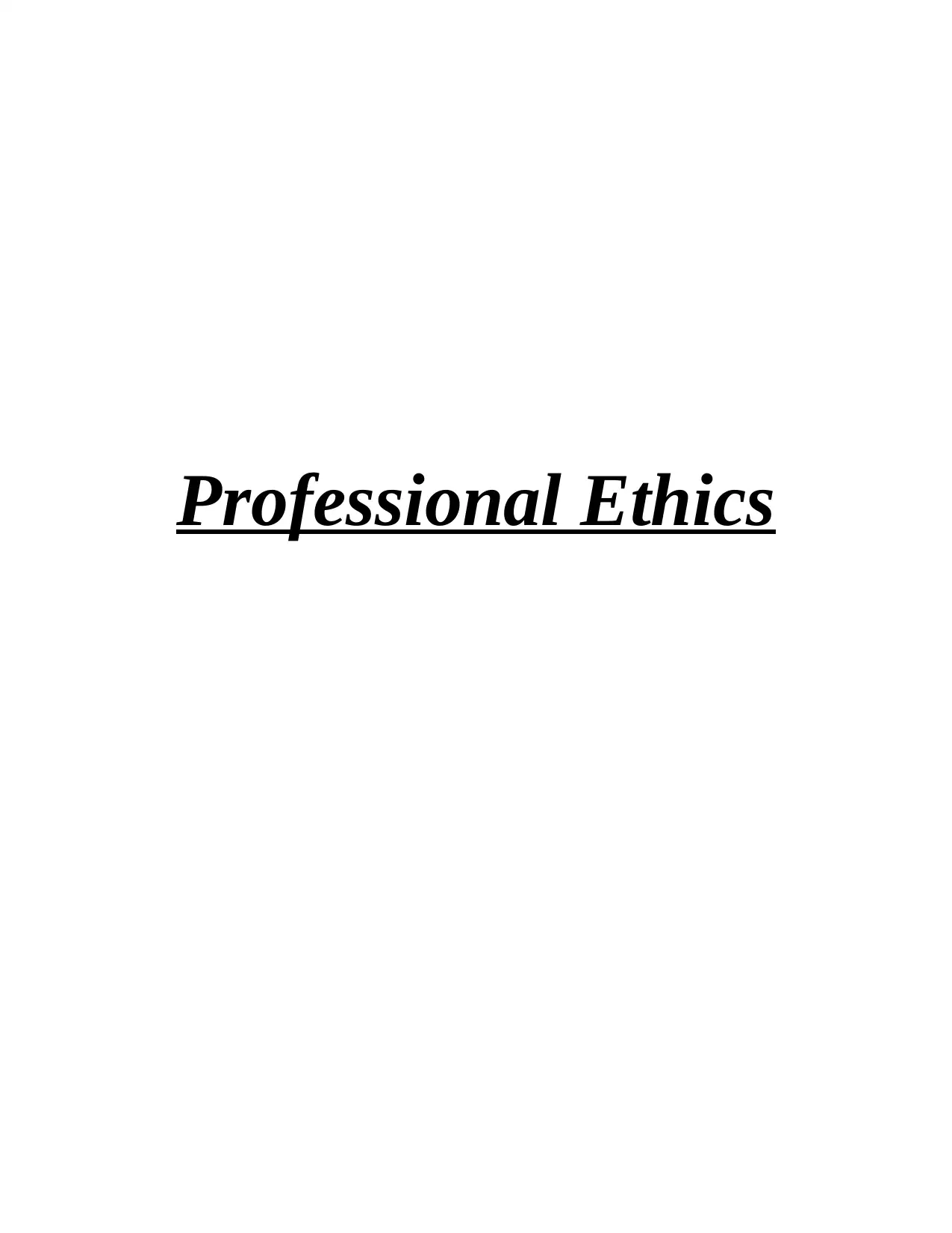
Professional Ethics
Paraphrase This Document
Need a fresh take? Get an instant paraphrase of this document with our AI Paraphraser
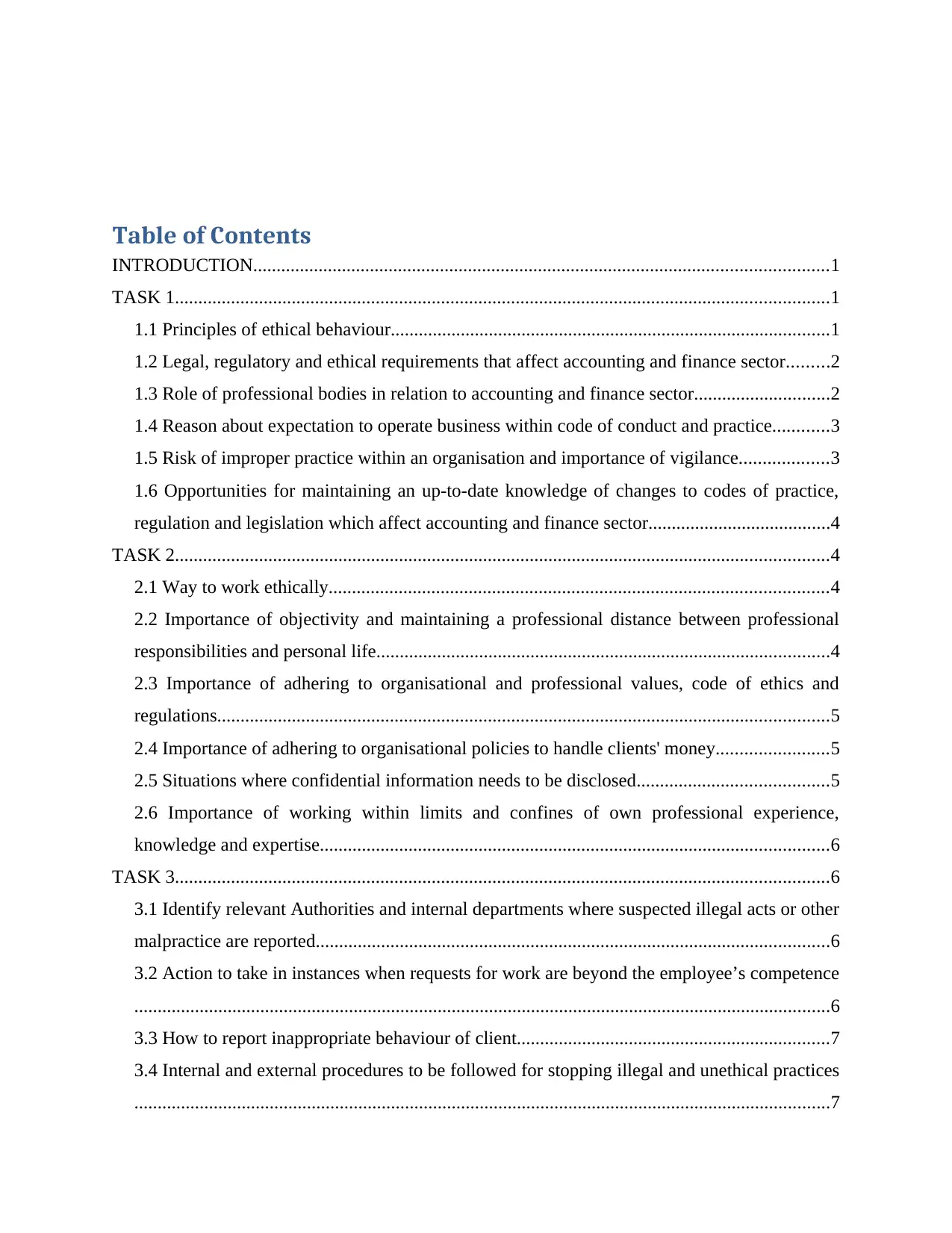
Table of Contents
INTRODUCTION...........................................................................................................................1
TASK 1............................................................................................................................................1
1.1 Principles of ethical behaviour..............................................................................................1
1.2 Legal, regulatory and ethical requirements that affect accounting and finance sector.........2
1.3 Role of professional bodies in relation to accounting and finance sector.............................2
1.4 Reason about expectation to operate business within code of conduct and practice............3
1.5 Risk of improper practice within an organisation and importance of vigilance...................3
1.6 Opportunities for maintaining an up-to-date knowledge of changes to codes of practice,
regulation and legislation which affect accounting and finance sector.......................................4
TASK 2............................................................................................................................................4
2.1 Way to work ethically...........................................................................................................4
2.2 Importance of objectivity and maintaining a professional distance between professional
responsibilities and personal life.................................................................................................4
2.3 Importance of adhering to organisational and professional values, code of ethics and
regulations...................................................................................................................................5
2.4 Importance of adhering to organisational policies to handle clients' money........................5
2.5 Situations where confidential information needs to be disclosed.........................................5
2.6 Importance of working within limits and confines of own professional experience,
knowledge and expertise.............................................................................................................6
TASK 3............................................................................................................................................6
3.1 Identify relevant Authorities and internal departments where suspected illegal acts or other
malpractice are reported..............................................................................................................6
3.2 Action to take in instances when requests for work are beyond the employee’s competence
.....................................................................................................................................................6
3.3 How to report inappropriate behaviour of client...................................................................7
3.4 Internal and external procedures to be followed for stopping illegal and unethical practices
.....................................................................................................................................................7
INTRODUCTION...........................................................................................................................1
TASK 1............................................................................................................................................1
1.1 Principles of ethical behaviour..............................................................................................1
1.2 Legal, regulatory and ethical requirements that affect accounting and finance sector.........2
1.3 Role of professional bodies in relation to accounting and finance sector.............................2
1.4 Reason about expectation to operate business within code of conduct and practice............3
1.5 Risk of improper practice within an organisation and importance of vigilance...................3
1.6 Opportunities for maintaining an up-to-date knowledge of changes to codes of practice,
regulation and legislation which affect accounting and finance sector.......................................4
TASK 2............................................................................................................................................4
2.1 Way to work ethically...........................................................................................................4
2.2 Importance of objectivity and maintaining a professional distance between professional
responsibilities and personal life.................................................................................................4
2.3 Importance of adhering to organisational and professional values, code of ethics and
regulations...................................................................................................................................5
2.4 Importance of adhering to organisational policies to handle clients' money........................5
2.5 Situations where confidential information needs to be disclosed.........................................5
2.6 Importance of working within limits and confines of own professional experience,
knowledge and expertise.............................................................................................................6
TASK 3............................................................................................................................................6
3.1 Identify relevant Authorities and internal departments where suspected illegal acts or other
malpractice are reported..............................................................................................................6
3.2 Action to take in instances when requests for work are beyond the employee’s competence
.....................................................................................................................................................6
3.3 How to report inappropriate behaviour of client...................................................................7
3.4 Internal and external procedures to be followed for stopping illegal and unethical practices
.....................................................................................................................................................7
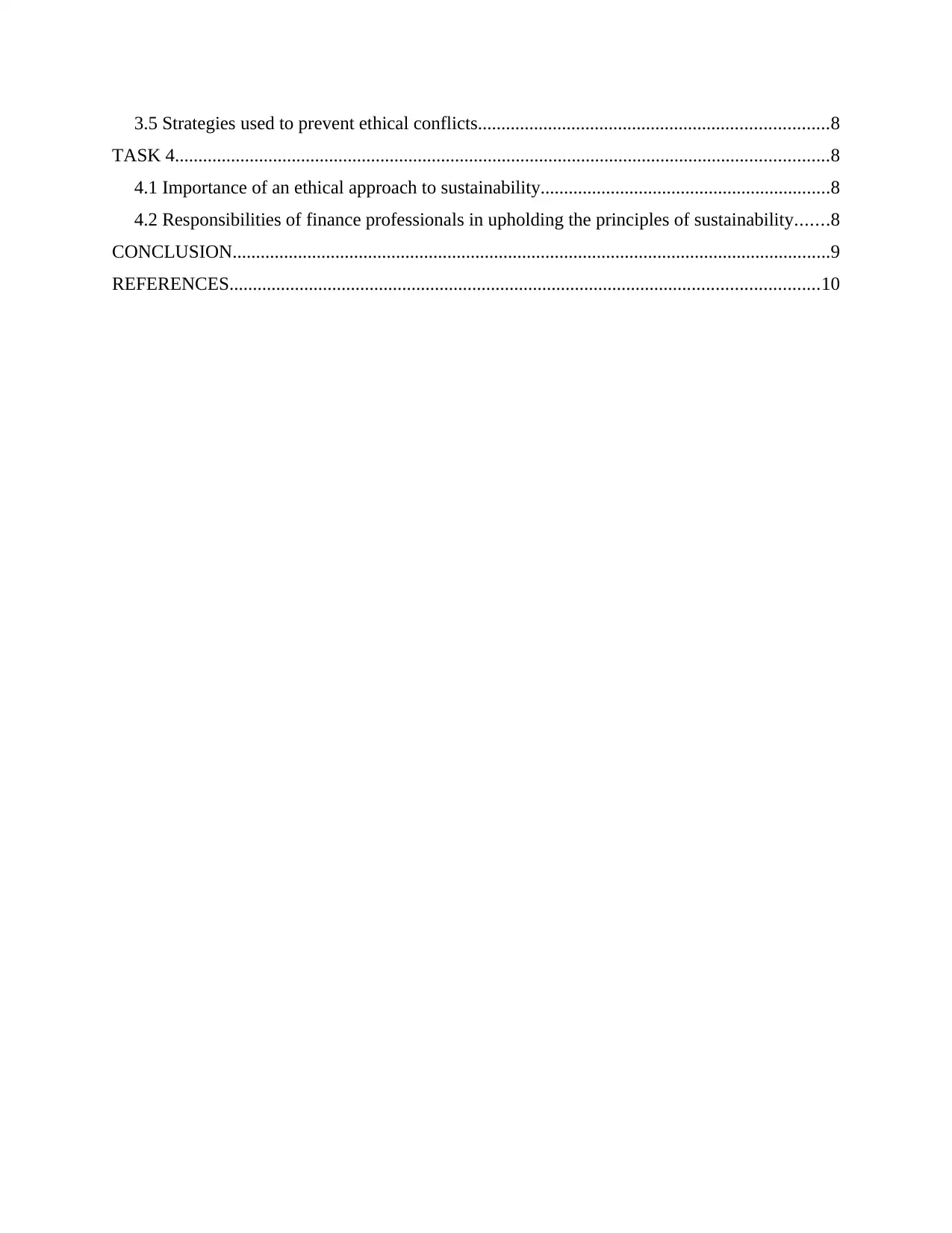
3.5 Strategies used to prevent ethical conflicts...........................................................................8
TASK 4............................................................................................................................................8
4.1 Importance of an ethical approach to sustainability..............................................................8
4.2 Responsibilities of finance professionals in upholding the principles of sustainability.......8
CONCLUSION................................................................................................................................9
REFERENCES..............................................................................................................................10
TASK 4............................................................................................................................................8
4.1 Importance of an ethical approach to sustainability..............................................................8
4.2 Responsibilities of finance professionals in upholding the principles of sustainability.......8
CONCLUSION................................................................................................................................9
REFERENCES..............................................................................................................................10
⊘ This is a preview!⊘
Do you want full access?
Subscribe today to unlock all pages.

Trusted by 1+ million students worldwide
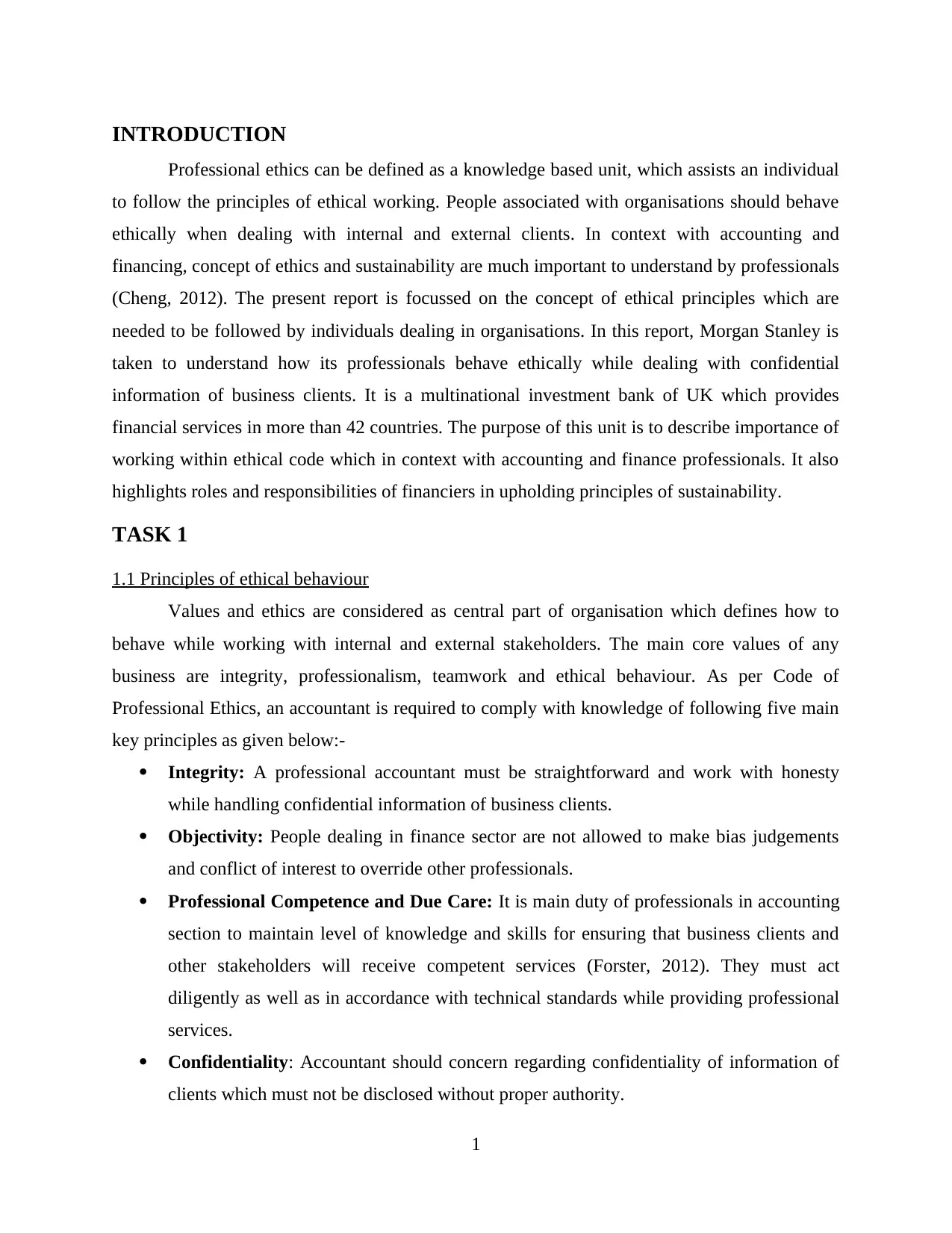
INTRODUCTION
Professional ethics can be defined as a knowledge based unit, which assists an individual
to follow the principles of ethical working. People associated with organisations should behave
ethically when dealing with internal and external clients. In context with accounting and
financing, concept of ethics and sustainability are much important to understand by professionals
(Cheng, 2012). The present report is focussed on the concept of ethical principles which are
needed to be followed by individuals dealing in organisations. In this report, Morgan Stanley is
taken to understand how its professionals behave ethically while dealing with confidential
information of business clients. It is a multinational investment bank of UK which provides
financial services in more than 42 countries. The purpose of this unit is to describe importance of
working within ethical code which in context with accounting and finance professionals. It also
highlights roles and responsibilities of financiers in upholding principles of sustainability.
TASK 1
1.1 Principles of ethical behaviour
Values and ethics are considered as central part of organisation which defines how to
behave while working with internal and external stakeholders. The main core values of any
business are integrity, professionalism, teamwork and ethical behaviour. As per Code of
Professional Ethics, an accountant is required to comply with knowledge of following five main
key principles as given below:-
Integrity: A professional accountant must be straightforward and work with honesty
while handling confidential information of business clients.
Objectivity: People dealing in finance sector are not allowed to make bias judgements
and conflict of interest to override other professionals.
Professional Competence and Due Care: It is main duty of professionals in accounting
section to maintain level of knowledge and skills for ensuring that business clients and
other stakeholders will receive competent services (Forster, 2012). They must act
diligently as well as in accordance with technical standards while providing professional
services.
Confidentiality: Accountant should concern regarding confidentiality of information of
clients which must not be disclosed without proper authority.
1
Professional ethics can be defined as a knowledge based unit, which assists an individual
to follow the principles of ethical working. People associated with organisations should behave
ethically when dealing with internal and external clients. In context with accounting and
financing, concept of ethics and sustainability are much important to understand by professionals
(Cheng, 2012). The present report is focussed on the concept of ethical principles which are
needed to be followed by individuals dealing in organisations. In this report, Morgan Stanley is
taken to understand how its professionals behave ethically while dealing with confidential
information of business clients. It is a multinational investment bank of UK which provides
financial services in more than 42 countries. The purpose of this unit is to describe importance of
working within ethical code which in context with accounting and finance professionals. It also
highlights roles and responsibilities of financiers in upholding principles of sustainability.
TASK 1
1.1 Principles of ethical behaviour
Values and ethics are considered as central part of organisation which defines how to
behave while working with internal and external stakeholders. The main core values of any
business are integrity, professionalism, teamwork and ethical behaviour. As per Code of
Professional Ethics, an accountant is required to comply with knowledge of following five main
key principles as given below:-
Integrity: A professional accountant must be straightforward and work with honesty
while handling confidential information of business clients.
Objectivity: People dealing in finance sector are not allowed to make bias judgements
and conflict of interest to override other professionals.
Professional Competence and Due Care: It is main duty of professionals in accounting
section to maintain level of knowledge and skills for ensuring that business clients and
other stakeholders will receive competent services (Forster, 2012). They must act
diligently as well as in accordance with technical standards while providing professional
services.
Confidentiality: Accountant should concern regarding confidentiality of information of
clients which must not be disclosed without proper authority.
1
Paraphrase This Document
Need a fresh take? Get an instant paraphrase of this document with our AI Paraphraser
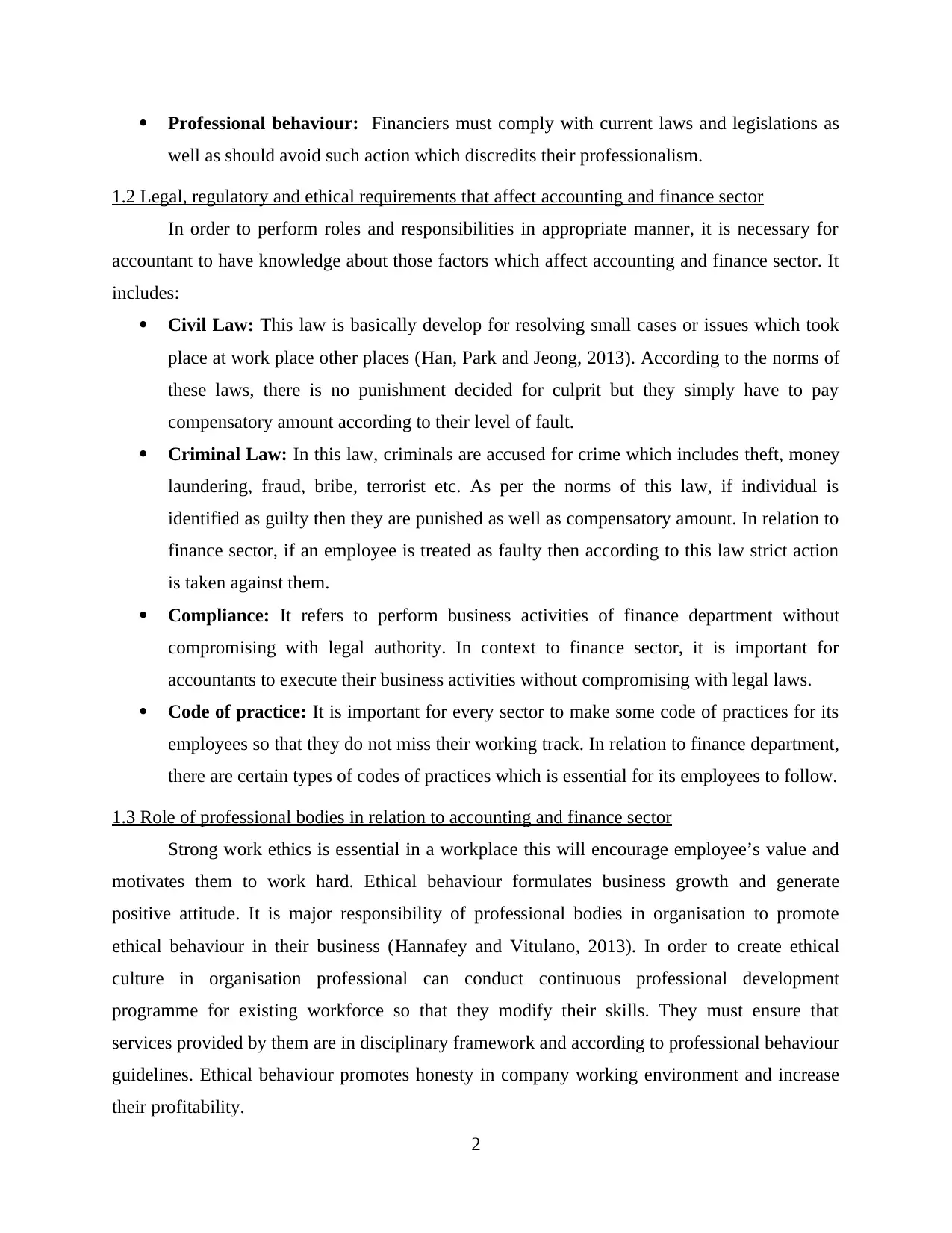
Professional behaviour: Financiers must comply with current laws and legislations as
well as should avoid such action which discredits their professionalism.
1.2 Legal, regulatory and ethical requirements that affect accounting and finance sector
In order to perform roles and responsibilities in appropriate manner, it is necessary for
accountant to have knowledge about those factors which affect accounting and finance sector. It
includes:
Civil Law: This law is basically develop for resolving small cases or issues which took
place at work place other places (Han, Park and Jeong, 2013). According to the norms of
these laws, there is no punishment decided for culprit but they simply have to pay
compensatory amount according to their level of fault.
Criminal Law: In this law, criminals are accused for crime which includes theft, money
laundering, fraud, bribe, terrorist etc. As per the norms of this law, if individual is
identified as guilty then they are punished as well as compensatory amount. In relation to
finance sector, if an employee is treated as faulty then according to this law strict action
is taken against them.
Compliance: It refers to perform business activities of finance department without
compromising with legal authority. In context to finance sector, it is important for
accountants to execute their business activities without compromising with legal laws.
Code of practice: It is important for every sector to make some code of practices for its
employees so that they do not miss their working track. In relation to finance department,
there are certain types of codes of practices which is essential for its employees to follow.
1.3 Role of professional bodies in relation to accounting and finance sector
Strong work ethics is essential in a workplace this will encourage employee’s value and
motivates them to work hard. Ethical behaviour formulates business growth and generate
positive attitude. It is major responsibility of professional bodies in organisation to promote
ethical behaviour in their business (Hannafey and Vitulano, 2013). In order to create ethical
culture in organisation professional can conduct continuous professional development
programme for existing workforce so that they modify their skills. They must ensure that
services provided by them are in disciplinary framework and according to professional behaviour
guidelines. Ethical behaviour promotes honesty in company working environment and increase
their profitability.
2
well as should avoid such action which discredits their professionalism.
1.2 Legal, regulatory and ethical requirements that affect accounting and finance sector
In order to perform roles and responsibilities in appropriate manner, it is necessary for
accountant to have knowledge about those factors which affect accounting and finance sector. It
includes:
Civil Law: This law is basically develop for resolving small cases or issues which took
place at work place other places (Han, Park and Jeong, 2013). According to the norms of
these laws, there is no punishment decided for culprit but they simply have to pay
compensatory amount according to their level of fault.
Criminal Law: In this law, criminals are accused for crime which includes theft, money
laundering, fraud, bribe, terrorist etc. As per the norms of this law, if individual is
identified as guilty then they are punished as well as compensatory amount. In relation to
finance sector, if an employee is treated as faulty then according to this law strict action
is taken against them.
Compliance: It refers to perform business activities of finance department without
compromising with legal authority. In context to finance sector, it is important for
accountants to execute their business activities without compromising with legal laws.
Code of practice: It is important for every sector to make some code of practices for its
employees so that they do not miss their working track. In relation to finance department,
there are certain types of codes of practices which is essential for its employees to follow.
1.3 Role of professional bodies in relation to accounting and finance sector
Strong work ethics is essential in a workplace this will encourage employee’s value and
motivates them to work hard. Ethical behaviour formulates business growth and generate
positive attitude. It is major responsibility of professional bodies in organisation to promote
ethical behaviour in their business (Hannafey and Vitulano, 2013). In order to create ethical
culture in organisation professional can conduct continuous professional development
programme for existing workforce so that they modify their skills. They must ensure that
services provided by them are in disciplinary framework and according to professional behaviour
guidelines. Ethical behaviour promotes honesty in company working environment and increase
their profitability.
2
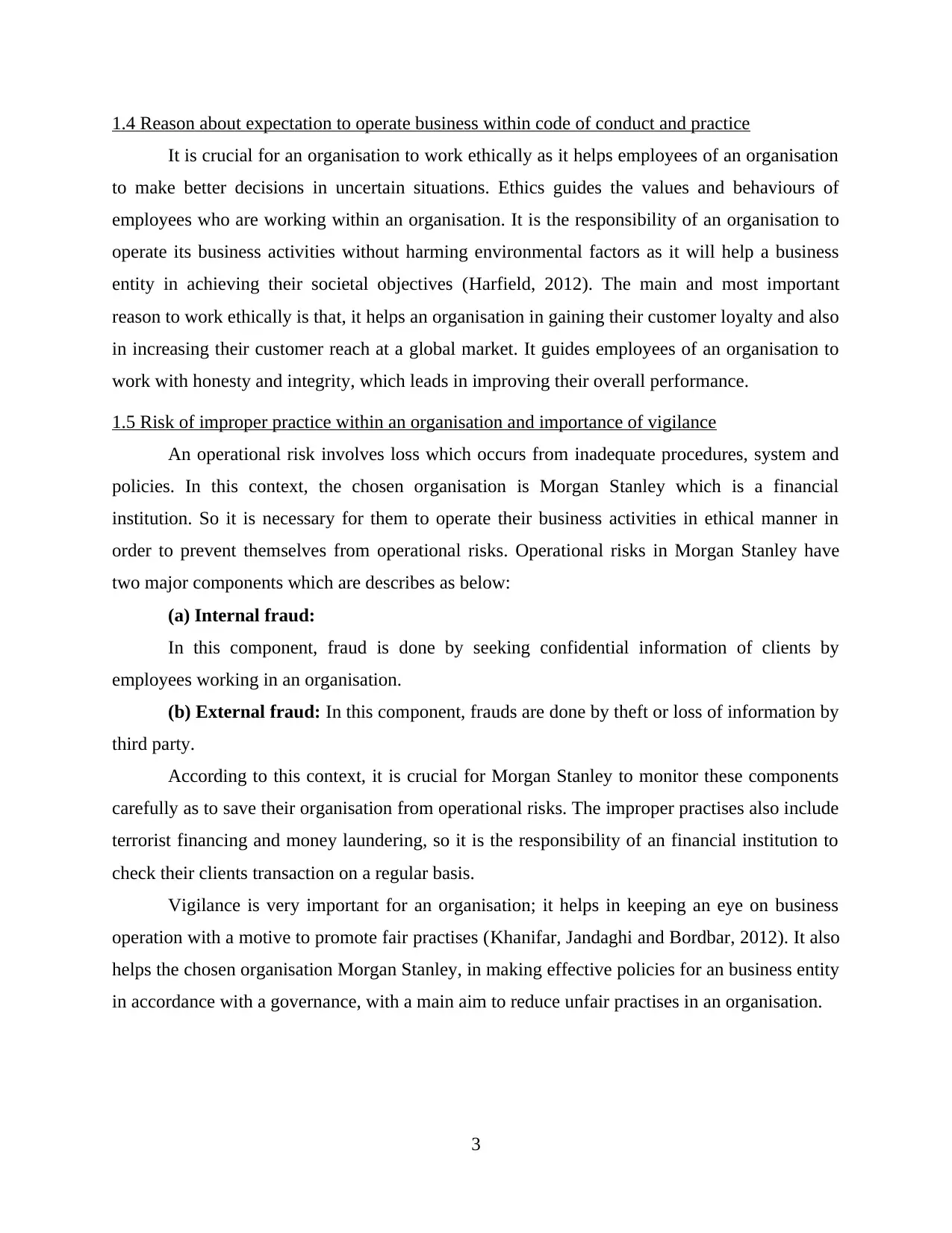
1.4 Reason about expectation to operate business within code of conduct and practice
It is crucial for an organisation to work ethically as it helps employees of an organisation
to make better decisions in uncertain situations. Ethics guides the values and behaviours of
employees who are working within an organisation. It is the responsibility of an organisation to
operate its business activities without harming environmental factors as it will help a business
entity in achieving their societal objectives (Harfield, 2012). The main and most important
reason to work ethically is that, it helps an organisation in gaining their customer loyalty and also
in increasing their customer reach at a global market. It guides employees of an organisation to
work with honesty and integrity, which leads in improving their overall performance.
1.5 Risk of improper practice within an organisation and importance of vigilance
An operational risk involves loss which occurs from inadequate procedures, system and
policies. In this context, the chosen organisation is Morgan Stanley which is a financial
institution. So it is necessary for them to operate their business activities in ethical manner in
order to prevent themselves from operational risks. Operational risks in Morgan Stanley have
two major components which are describes as below:
(a) Internal fraud:
In this component, fraud is done by seeking confidential information of clients by
employees working in an organisation.
(b) External fraud: In this component, frauds are done by theft or loss of information by
third party.
According to this context, it is crucial for Morgan Stanley to monitor these components
carefully as to save their organisation from operational risks. The improper practises also include
terrorist financing and money laundering, so it is the responsibility of an financial institution to
check their clients transaction on a regular basis.
Vigilance is very important for an organisation; it helps in keeping an eye on business
operation with a motive to promote fair practises (Khanifar, Jandaghi and Bordbar, 2012). It also
helps the chosen organisation Morgan Stanley, in making effective policies for an business entity
in accordance with a governance, with a main aim to reduce unfair practises in an organisation.
3
It is crucial for an organisation to work ethically as it helps employees of an organisation
to make better decisions in uncertain situations. Ethics guides the values and behaviours of
employees who are working within an organisation. It is the responsibility of an organisation to
operate its business activities without harming environmental factors as it will help a business
entity in achieving their societal objectives (Harfield, 2012). The main and most important
reason to work ethically is that, it helps an organisation in gaining their customer loyalty and also
in increasing their customer reach at a global market. It guides employees of an organisation to
work with honesty and integrity, which leads in improving their overall performance.
1.5 Risk of improper practice within an organisation and importance of vigilance
An operational risk involves loss which occurs from inadequate procedures, system and
policies. In this context, the chosen organisation is Morgan Stanley which is a financial
institution. So it is necessary for them to operate their business activities in ethical manner in
order to prevent themselves from operational risks. Operational risks in Morgan Stanley have
two major components which are describes as below:
(a) Internal fraud:
In this component, fraud is done by seeking confidential information of clients by
employees working in an organisation.
(b) External fraud: In this component, frauds are done by theft or loss of information by
third party.
According to this context, it is crucial for Morgan Stanley to monitor these components
carefully as to save their organisation from operational risks. The improper practises also include
terrorist financing and money laundering, so it is the responsibility of an financial institution to
check their clients transaction on a regular basis.
Vigilance is very important for an organisation; it helps in keeping an eye on business
operation with a motive to promote fair practises (Khanifar, Jandaghi and Bordbar, 2012). It also
helps the chosen organisation Morgan Stanley, in making effective policies for an business entity
in accordance with a governance, with a main aim to reduce unfair practises in an organisation.
3
⊘ This is a preview!⊘
Do you want full access?
Subscribe today to unlock all pages.

Trusted by 1+ million students worldwide
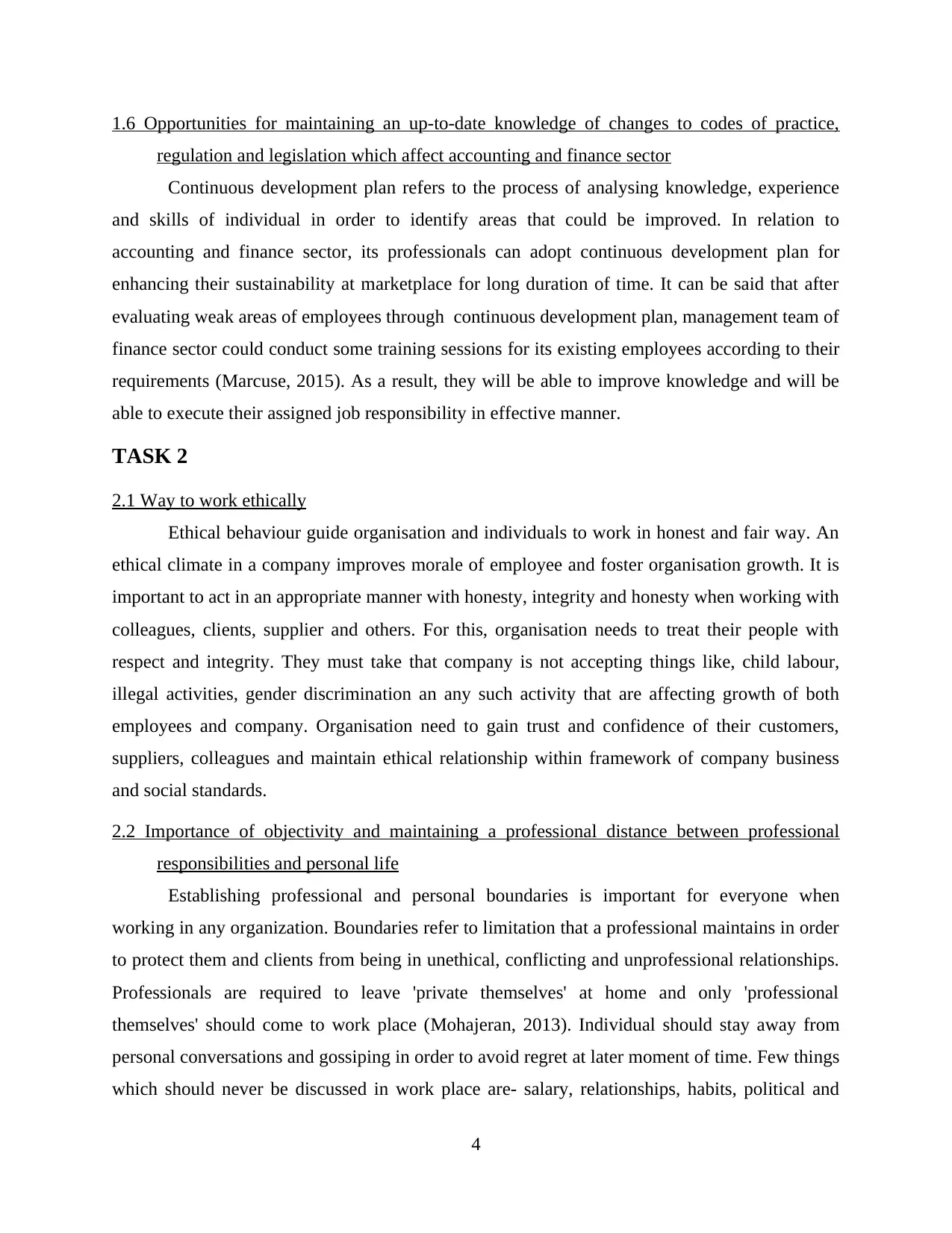
1.6 Opportunities for maintaining an up-to-date knowledge of changes to codes of practice,
regulation and legislation which affect accounting and finance sector
Continuous development plan refers to the process of analysing knowledge, experience
and skills of individual in order to identify areas that could be improved. In relation to
accounting and finance sector, its professionals can adopt continuous development plan for
enhancing their sustainability at marketplace for long duration of time. It can be said that after
evaluating weak areas of employees through continuous development plan, management team of
finance sector could conduct some training sessions for its existing employees according to their
requirements (Marcuse, 2015). As a result, they will be able to improve knowledge and will be
able to execute their assigned job responsibility in effective manner.
TASK 2
2.1 Way to work ethically
Ethical behaviour guide organisation and individuals to work in honest and fair way. An
ethical climate in a company improves morale of employee and foster organisation growth. It is
important to act in an appropriate manner with honesty, integrity and honesty when working with
colleagues, clients, supplier and others. For this, organisation needs to treat their people with
respect and integrity. They must take that company is not accepting things like, child labour,
illegal activities, gender discrimination an any such activity that are affecting growth of both
employees and company. Organisation need to gain trust and confidence of their customers,
suppliers, colleagues and maintain ethical relationship within framework of company business
and social standards.
2.2 Importance of objectivity and maintaining a professional distance between professional
responsibilities and personal life
Establishing professional and personal boundaries is important for everyone when
working in any organization. Boundaries refer to limitation that a professional maintains in order
to protect them and clients from being in unethical, conflicting and unprofessional relationships.
Professionals are required to leave 'private themselves' at home and only 'professional
themselves' should come to work place (Mohajeran, 2013). Individual should stay away from
personal conversations and gossiping in order to avoid regret at later moment of time. Few things
which should never be discussed in work place are- salary, relationships, habits, political and
4
regulation and legislation which affect accounting and finance sector
Continuous development plan refers to the process of analysing knowledge, experience
and skills of individual in order to identify areas that could be improved. In relation to
accounting and finance sector, its professionals can adopt continuous development plan for
enhancing their sustainability at marketplace for long duration of time. It can be said that after
evaluating weak areas of employees through continuous development plan, management team of
finance sector could conduct some training sessions for its existing employees according to their
requirements (Marcuse, 2015). As a result, they will be able to improve knowledge and will be
able to execute their assigned job responsibility in effective manner.
TASK 2
2.1 Way to work ethically
Ethical behaviour guide organisation and individuals to work in honest and fair way. An
ethical climate in a company improves morale of employee and foster organisation growth. It is
important to act in an appropriate manner with honesty, integrity and honesty when working with
colleagues, clients, supplier and others. For this, organisation needs to treat their people with
respect and integrity. They must take that company is not accepting things like, child labour,
illegal activities, gender discrimination an any such activity that are affecting growth of both
employees and company. Organisation need to gain trust and confidence of their customers,
suppliers, colleagues and maintain ethical relationship within framework of company business
and social standards.
2.2 Importance of objectivity and maintaining a professional distance between professional
responsibilities and personal life
Establishing professional and personal boundaries is important for everyone when
working in any organization. Boundaries refer to limitation that a professional maintains in order
to protect them and clients from being in unethical, conflicting and unprofessional relationships.
Professionals are required to leave 'private themselves' at home and only 'professional
themselves' should come to work place (Mohajeran, 2013). Individual should stay away from
personal conversations and gossiping in order to avoid regret at later moment of time. Few things
which should never be discussed in work place are- salary, relationships, habits, political and
4
Paraphrase This Document
Need a fresh take? Get an instant paraphrase of this document with our AI Paraphraser
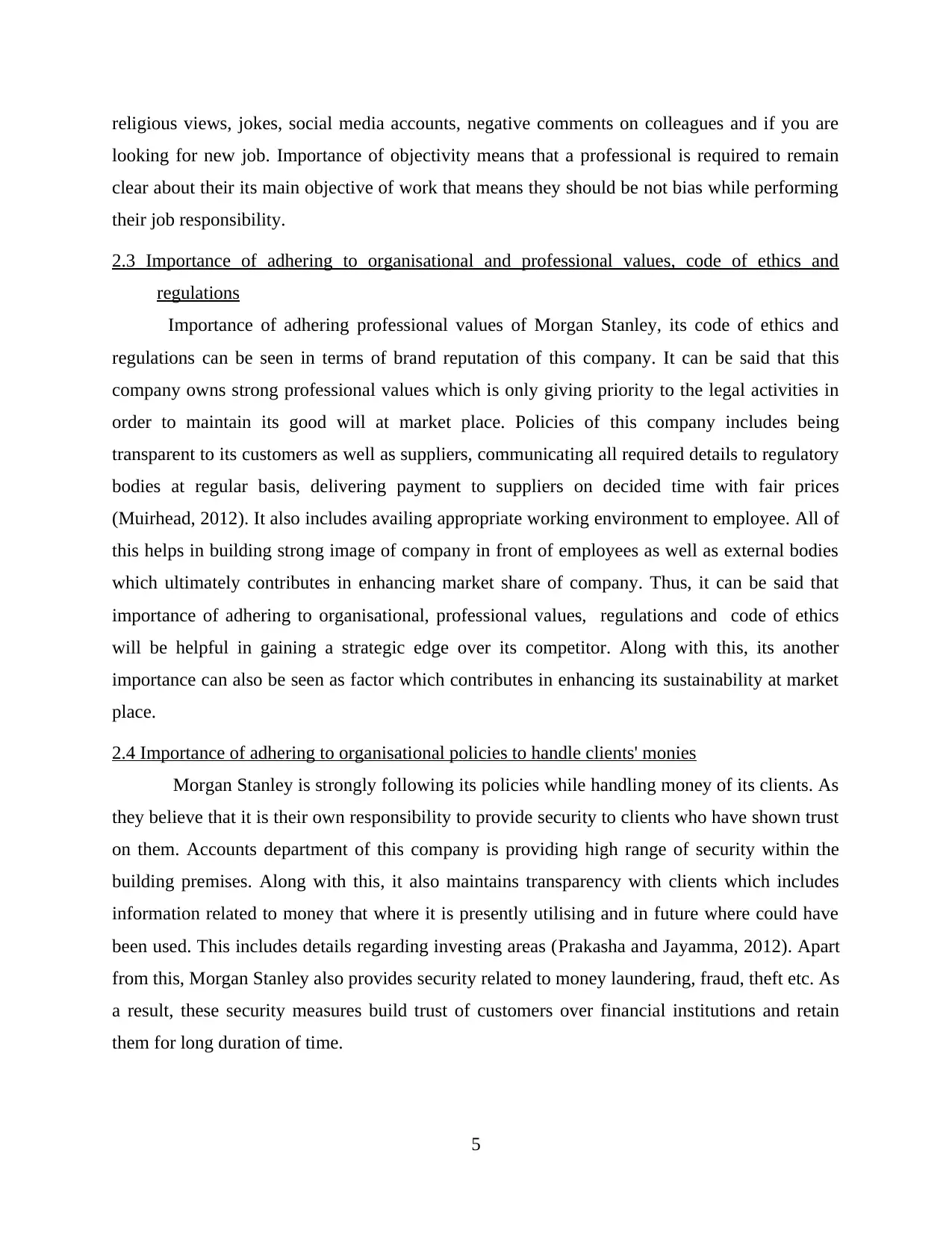
religious views, jokes, social media accounts, negative comments on colleagues and if you are
looking for new job. Importance of objectivity means that a professional is required to remain
clear about their its main objective of work that means they should be not bias while performing
their job responsibility.
2.3 Importance of adhering to organisational and professional values, code of ethics and
regulations
Importance of adhering professional values of Morgan Stanley, its code of ethics and
regulations can be seen in terms of brand reputation of this company. It can be said that this
company owns strong professional values which is only giving priority to the legal activities in
order to maintain its good will at market place. Policies of this company includes being
transparent to its customers as well as suppliers, communicating all required details to regulatory
bodies at regular basis, delivering payment to suppliers on decided time with fair prices
(Muirhead, 2012). It also includes availing appropriate working environment to employee. All of
this helps in building strong image of company in front of employees as well as external bodies
which ultimately contributes in enhancing market share of company. Thus, it can be said that
importance of adhering to organisational, professional values, regulations and code of ethics
will be helpful in gaining a strategic edge over its competitor. Along with this, its another
importance can also be seen as factor which contributes in enhancing its sustainability at market
place.
2.4 Importance of adhering to organisational policies to handle clients' monies
Morgan Stanley is strongly following its policies while handling money of its clients. As
they believe that it is their own responsibility to provide security to clients who have shown trust
on them. Accounts department of this company is providing high range of security within the
building premises. Along with this, it also maintains transparency with clients which includes
information related to money that where it is presently utilising and in future where could have
been used. This includes details regarding investing areas (Prakasha and Jayamma, 2012). Apart
from this, Morgan Stanley also provides security related to money laundering, fraud, theft etc. As
a result, these security measures build trust of customers over financial institutions and retain
them for long duration of time.
5
looking for new job. Importance of objectivity means that a professional is required to remain
clear about their its main objective of work that means they should be not bias while performing
their job responsibility.
2.3 Importance of adhering to organisational and professional values, code of ethics and
regulations
Importance of adhering professional values of Morgan Stanley, its code of ethics and
regulations can be seen in terms of brand reputation of this company. It can be said that this
company owns strong professional values which is only giving priority to the legal activities in
order to maintain its good will at market place. Policies of this company includes being
transparent to its customers as well as suppliers, communicating all required details to regulatory
bodies at regular basis, delivering payment to suppliers on decided time with fair prices
(Muirhead, 2012). It also includes availing appropriate working environment to employee. All of
this helps in building strong image of company in front of employees as well as external bodies
which ultimately contributes in enhancing market share of company. Thus, it can be said that
importance of adhering to organisational, professional values, regulations and code of ethics
will be helpful in gaining a strategic edge over its competitor. Along with this, its another
importance can also be seen as factor which contributes in enhancing its sustainability at market
place.
2.4 Importance of adhering to organisational policies to handle clients' monies
Morgan Stanley is strongly following its policies while handling money of its clients. As
they believe that it is their own responsibility to provide security to clients who have shown trust
on them. Accounts department of this company is providing high range of security within the
building premises. Along with this, it also maintains transparency with clients which includes
information related to money that where it is presently utilising and in future where could have
been used. This includes details regarding investing areas (Prakasha and Jayamma, 2012). Apart
from this, Morgan Stanley also provides security related to money laundering, fraud, theft etc. As
a result, these security measures build trust of customers over financial institutions and retain
them for long duration of time.
5
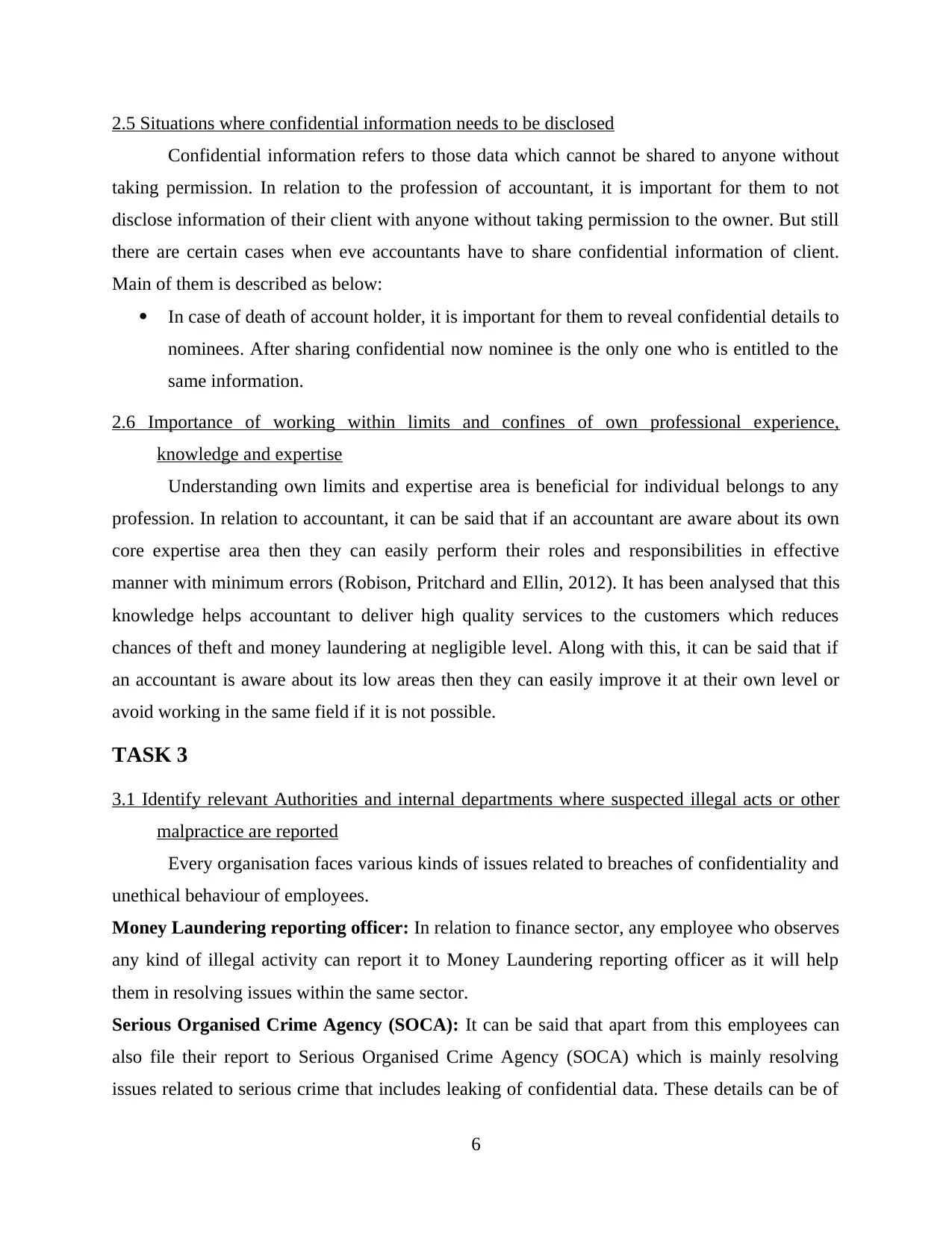
2.5 Situations where confidential information needs to be disclosed
Confidential information refers to those data which cannot be shared to anyone without
taking permission. In relation to the profession of accountant, it is important for them to not
disclose information of their client with anyone without taking permission to the owner. But still
there are certain cases when eve accountants have to share confidential information of client.
Main of them is described as below:
In case of death of account holder, it is important for them to reveal confidential details to
nominees. After sharing confidential now nominee is the only one who is entitled to the
same information.
2.6 Importance of working within limits and confines of own professional experience,
knowledge and expertise
Understanding own limits and expertise area is beneficial for individual belongs to any
profession. In relation to accountant, it can be said that if an accountant are aware about its own
core expertise area then they can easily perform their roles and responsibilities in effective
manner with minimum errors (Robison, Pritchard and Ellin, 2012). It has been analysed that this
knowledge helps accountant to deliver high quality services to the customers which reduces
chances of theft and money laundering at negligible level. Along with this, it can be said that if
an accountant is aware about its low areas then they can easily improve it at their own level or
avoid working in the same field if it is not possible.
TASK 3
3.1 Identify relevant Authorities and internal departments where suspected illegal acts or other
malpractice are reported
Every organisation faces various kinds of issues related to breaches of confidentiality and
unethical behaviour of employees.
Money Laundering reporting officer: In relation to finance sector, any employee who observes
any kind of illegal activity can report it to Money Laundering reporting officer as it will help
them in resolving issues within the same sector.
Serious Organised Crime Agency (SOCA): It can be said that apart from this employees can
also file their report to Serious Organised Crime Agency (SOCA) which is mainly resolving
issues related to serious crime that includes leaking of confidential data. These details can be of
6
Confidential information refers to those data which cannot be shared to anyone without
taking permission. In relation to the profession of accountant, it is important for them to not
disclose information of their client with anyone without taking permission to the owner. But still
there are certain cases when eve accountants have to share confidential information of client.
Main of them is described as below:
In case of death of account holder, it is important for them to reveal confidential details to
nominees. After sharing confidential now nominee is the only one who is entitled to the
same information.
2.6 Importance of working within limits and confines of own professional experience,
knowledge and expertise
Understanding own limits and expertise area is beneficial for individual belongs to any
profession. In relation to accountant, it can be said that if an accountant are aware about its own
core expertise area then they can easily perform their roles and responsibilities in effective
manner with minimum errors (Robison, Pritchard and Ellin, 2012). It has been analysed that this
knowledge helps accountant to deliver high quality services to the customers which reduces
chances of theft and money laundering at negligible level. Along with this, it can be said that if
an accountant is aware about its low areas then they can easily improve it at their own level or
avoid working in the same field if it is not possible.
TASK 3
3.1 Identify relevant Authorities and internal departments where suspected illegal acts or other
malpractice are reported
Every organisation faces various kinds of issues related to breaches of confidentiality and
unethical behaviour of employees.
Money Laundering reporting officer: In relation to finance sector, any employee who observes
any kind of illegal activity can report it to Money Laundering reporting officer as it will help
them in resolving issues within the same sector.
Serious Organised Crime Agency (SOCA): It can be said that apart from this employees can
also file their report to Serious Organised Crime Agency (SOCA) which is mainly resolving
issues related to serious crime that includes leaking of confidential data. These details can be of
6
⊘ This is a preview!⊘
Do you want full access?
Subscribe today to unlock all pages.

Trusted by 1+ million students worldwide
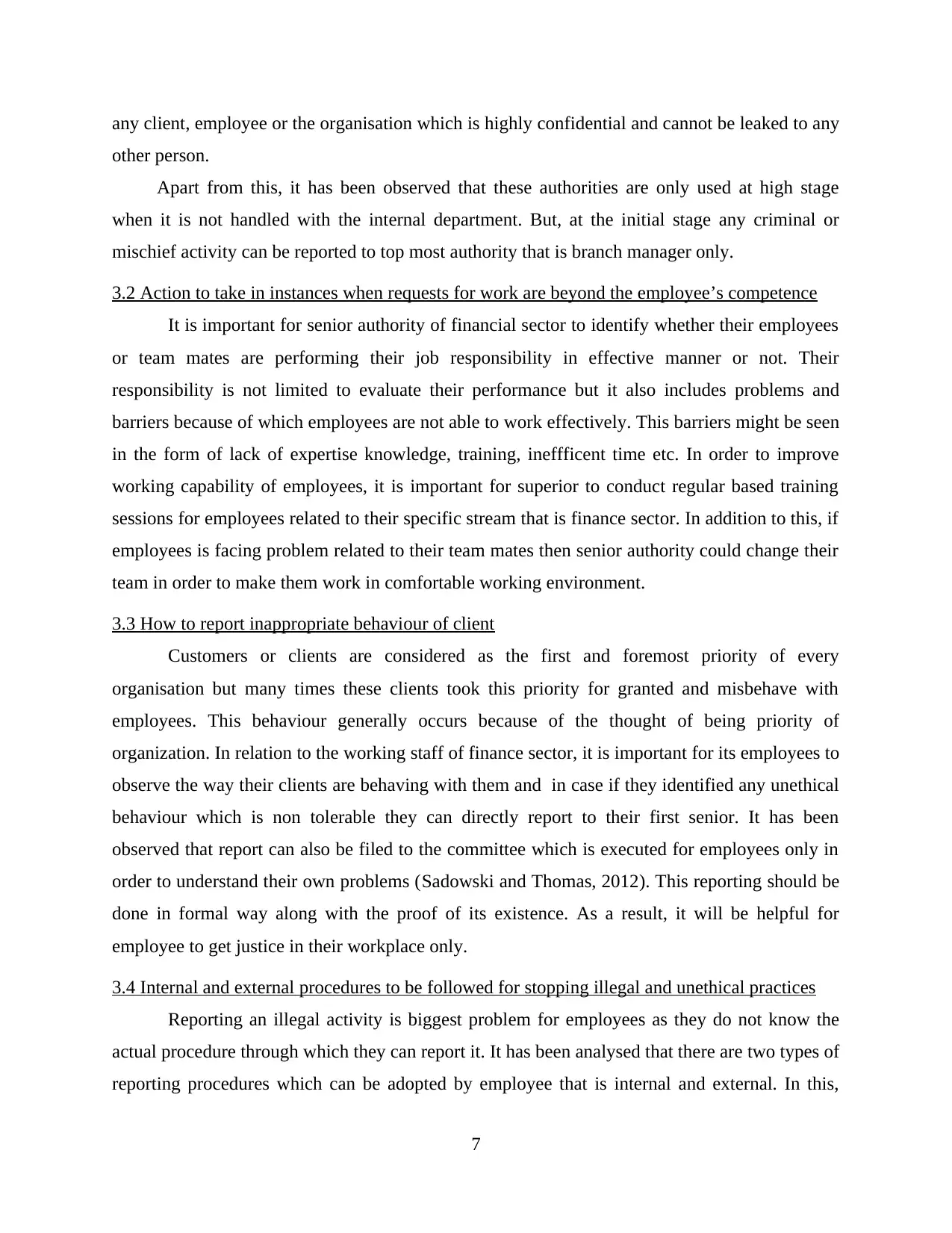
any client, employee or the organisation which is highly confidential and cannot be leaked to any
other person.
Apart from this, it has been observed that these authorities are only used at high stage
when it is not handled with the internal department. But, at the initial stage any criminal or
mischief activity can be reported to top most authority that is branch manager only.
3.2 Action to take in instances when requests for work are beyond the employee’s competence
It is important for senior authority of financial sector to identify whether their employees
or team mates are performing their job responsibility in effective manner or not. Their
responsibility is not limited to evaluate their performance but it also includes problems and
barriers because of which employees are not able to work effectively. This barriers might be seen
in the form of lack of expertise knowledge, training, ineffficent time etc. In order to improve
working capability of employees, it is important for superior to conduct regular based training
sessions for employees related to their specific stream that is finance sector. In addition to this, if
employees is facing problem related to their team mates then senior authority could change their
team in order to make them work in comfortable working environment.
3.3 How to report inappropriate behaviour of client
Customers or clients are considered as the first and foremost priority of every
organisation but many times these clients took this priority for granted and misbehave with
employees. This behaviour generally occurs because of the thought of being priority of
organization. In relation to the working staff of finance sector, it is important for its employees to
observe the way their clients are behaving with them and in case if they identified any unethical
behaviour which is non tolerable they can directly report to their first senior. It has been
observed that report can also be filed to the committee which is executed for employees only in
order to understand their own problems (Sadowski and Thomas, 2012). This reporting should be
done in formal way along with the proof of its existence. As a result, it will be helpful for
employee to get justice in their workplace only.
3.4 Internal and external procedures to be followed for stopping illegal and unethical practices
Reporting an illegal activity is biggest problem for employees as they do not know the
actual procedure through which they can report it. It has been analysed that there are two types of
reporting procedures which can be adopted by employee that is internal and external. In this,
7
other person.
Apart from this, it has been observed that these authorities are only used at high stage
when it is not handled with the internal department. But, at the initial stage any criminal or
mischief activity can be reported to top most authority that is branch manager only.
3.2 Action to take in instances when requests for work are beyond the employee’s competence
It is important for senior authority of financial sector to identify whether their employees
or team mates are performing their job responsibility in effective manner or not. Their
responsibility is not limited to evaluate their performance but it also includes problems and
barriers because of which employees are not able to work effectively. This barriers might be seen
in the form of lack of expertise knowledge, training, ineffficent time etc. In order to improve
working capability of employees, it is important for superior to conduct regular based training
sessions for employees related to their specific stream that is finance sector. In addition to this, if
employees is facing problem related to their team mates then senior authority could change their
team in order to make them work in comfortable working environment.
3.3 How to report inappropriate behaviour of client
Customers or clients are considered as the first and foremost priority of every
organisation but many times these clients took this priority for granted and misbehave with
employees. This behaviour generally occurs because of the thought of being priority of
organization. In relation to the working staff of finance sector, it is important for its employees to
observe the way their clients are behaving with them and in case if they identified any unethical
behaviour which is non tolerable they can directly report to their first senior. It has been
observed that report can also be filed to the committee which is executed for employees only in
order to understand their own problems (Sadowski and Thomas, 2012). This reporting should be
done in formal way along with the proof of its existence. As a result, it will be helpful for
employee to get justice in their workplace only.
3.4 Internal and external procedures to be followed for stopping illegal and unethical practices
Reporting an illegal activity is biggest problem for employees as they do not know the
actual procedure through which they can report it. It has been analysed that there are two types of
reporting procedures which can be adopted by employee that is internal and external. In this,
7
Paraphrase This Document
Need a fresh take? Get an instant paraphrase of this document with our AI Paraphraser
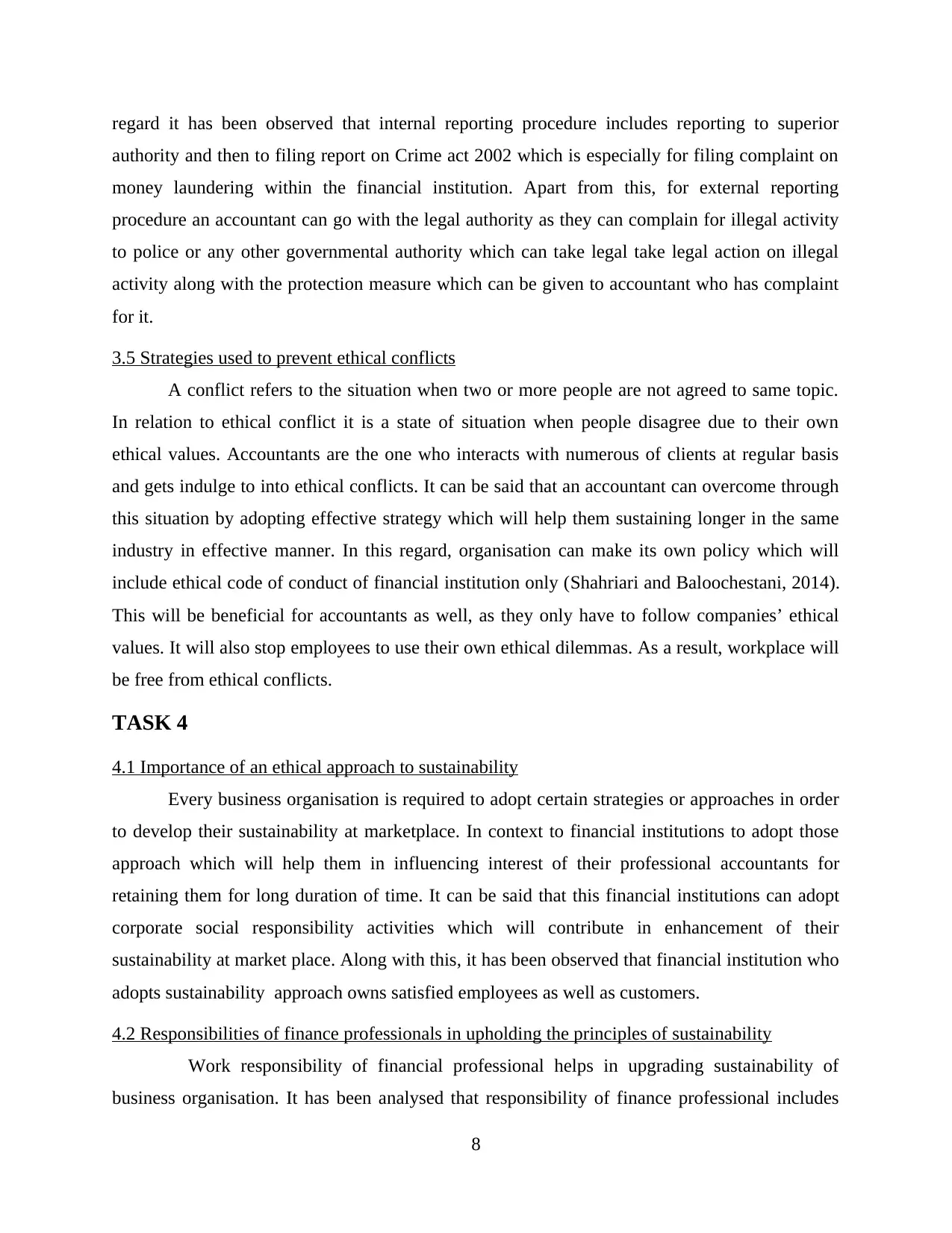
regard it has been observed that internal reporting procedure includes reporting to superior
authority and then to filing report on Crime act 2002 which is especially for filing complaint on
money laundering within the financial institution. Apart from this, for external reporting
procedure an accountant can go with the legal authority as they can complain for illegal activity
to police or any other governmental authority which can take legal take legal action on illegal
activity along with the protection measure which can be given to accountant who has complaint
for it.
3.5 Strategies used to prevent ethical conflicts
A conflict refers to the situation when two or more people are not agreed to same topic.
In relation to ethical conflict it is a state of situation when people disagree due to their own
ethical values. Accountants are the one who interacts with numerous of clients at regular basis
and gets indulge to into ethical conflicts. It can be said that an accountant can overcome through
this situation by adopting effective strategy which will help them sustaining longer in the same
industry in effective manner. In this regard, organisation can make its own policy which will
include ethical code of conduct of financial institution only (Shahriari and Baloochestani, 2014).
This will be beneficial for accountants as well, as they only have to follow companies’ ethical
values. It will also stop employees to use their own ethical dilemmas. As a result, workplace will
be free from ethical conflicts.
TASK 4
4.1 Importance of an ethical approach to sustainability
Every business organisation is required to adopt certain strategies or approaches in order
to develop their sustainability at marketplace. In context to financial institutions to adopt those
approach which will help them in influencing interest of their professional accountants for
retaining them for long duration of time. It can be said that this financial institutions can adopt
corporate social responsibility activities which will contribute in enhancement of their
sustainability at market place. Along with this, it has been observed that financial institution who
adopts sustainability approach owns satisfied employees as well as customers.
4.2 Responsibilities of finance professionals in upholding the principles of sustainability
Work responsibility of financial professional helps in upgrading sustainability of
business organisation. It has been analysed that responsibility of finance professional includes
8
authority and then to filing report on Crime act 2002 which is especially for filing complaint on
money laundering within the financial institution. Apart from this, for external reporting
procedure an accountant can go with the legal authority as they can complain for illegal activity
to police or any other governmental authority which can take legal take legal action on illegal
activity along with the protection measure which can be given to accountant who has complaint
for it.
3.5 Strategies used to prevent ethical conflicts
A conflict refers to the situation when two or more people are not agreed to same topic.
In relation to ethical conflict it is a state of situation when people disagree due to their own
ethical values. Accountants are the one who interacts with numerous of clients at regular basis
and gets indulge to into ethical conflicts. It can be said that an accountant can overcome through
this situation by adopting effective strategy which will help them sustaining longer in the same
industry in effective manner. In this regard, organisation can make its own policy which will
include ethical code of conduct of financial institution only (Shahriari and Baloochestani, 2014).
This will be beneficial for accountants as well, as they only have to follow companies’ ethical
values. It will also stop employees to use their own ethical dilemmas. As a result, workplace will
be free from ethical conflicts.
TASK 4
4.1 Importance of an ethical approach to sustainability
Every business organisation is required to adopt certain strategies or approaches in order
to develop their sustainability at marketplace. In context to financial institutions to adopt those
approach which will help them in influencing interest of their professional accountants for
retaining them for long duration of time. It can be said that this financial institutions can adopt
corporate social responsibility activities which will contribute in enhancement of their
sustainability at market place. Along with this, it has been observed that financial institution who
adopts sustainability approach owns satisfied employees as well as customers.
4.2 Responsibilities of finance professionals in upholding the principles of sustainability
Work responsibility of financial professional helps in upgrading sustainability of
business organisation. It has been analysed that responsibility of finance professional includes
8
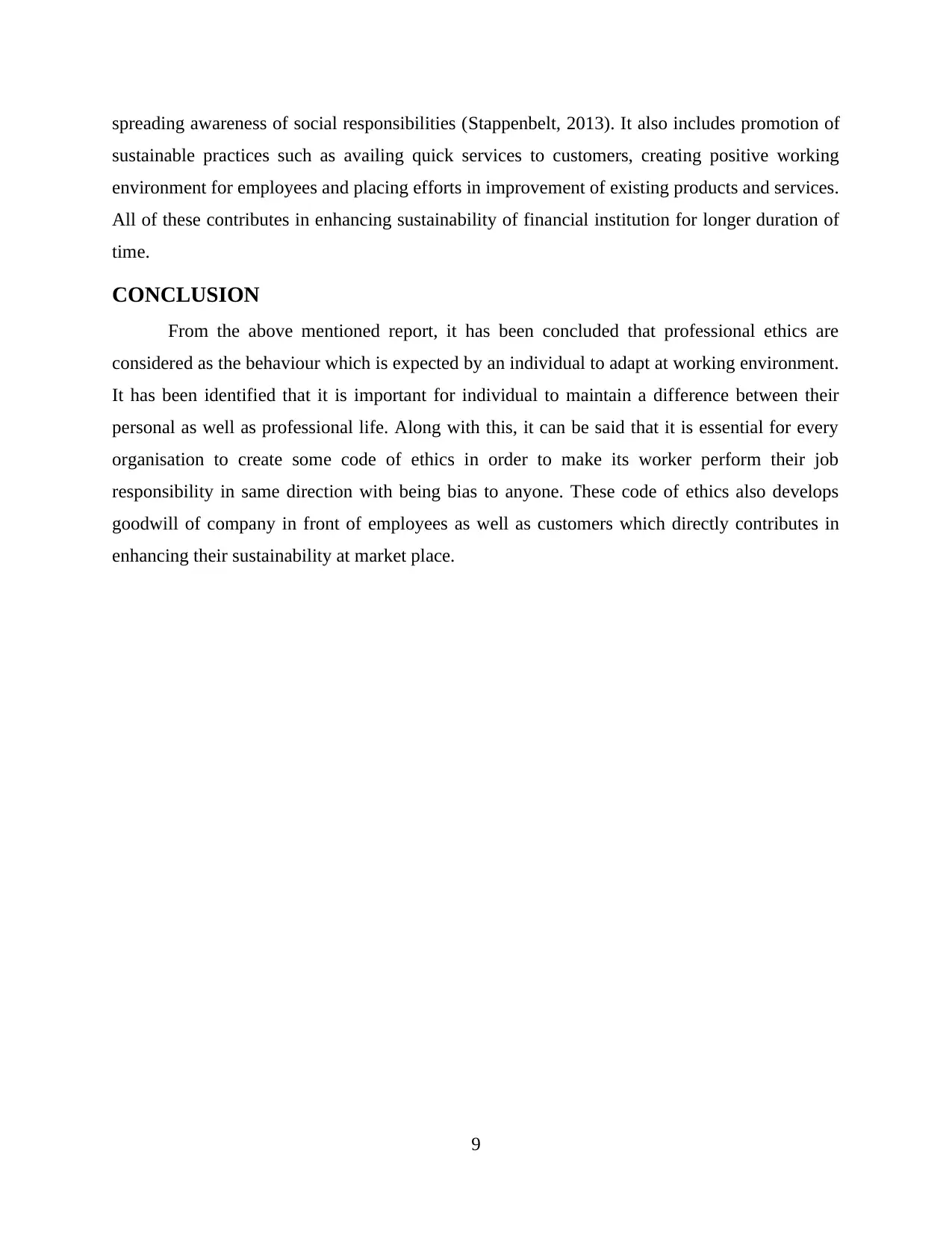
spreading awareness of social responsibilities (Stappenbelt, 2013). It also includes promotion of
sustainable practices such as availing quick services to customers, creating positive working
environment for employees and placing efforts in improvement of existing products and services.
All of these contributes in enhancing sustainability of financial institution for longer duration of
time.
CONCLUSION
From the above mentioned report, it has been concluded that professional ethics are
considered as the behaviour which is expected by an individual to adapt at working environment.
It has been identified that it is important for individual to maintain a difference between their
personal as well as professional life. Along with this, it can be said that it is essential for every
organisation to create some code of ethics in order to make its worker perform their job
responsibility in same direction with being bias to anyone. These code of ethics also develops
goodwill of company in front of employees as well as customers which directly contributes in
enhancing their sustainability at market place.
9
sustainable practices such as availing quick services to customers, creating positive working
environment for employees and placing efforts in improvement of existing products and services.
All of these contributes in enhancing sustainability of financial institution for longer duration of
time.
CONCLUSION
From the above mentioned report, it has been concluded that professional ethics are
considered as the behaviour which is expected by an individual to adapt at working environment.
It has been identified that it is important for individual to maintain a difference between their
personal as well as professional life. Along with this, it can be said that it is essential for every
organisation to create some code of ethics in order to make its worker perform their job
responsibility in same direction with being bias to anyone. These code of ethics also develops
goodwill of company in front of employees as well as customers which directly contributes in
enhancing their sustainability at market place.
9
⊘ This is a preview!⊘
Do you want full access?
Subscribe today to unlock all pages.

Trusted by 1+ million students worldwide
1 out of 13
Related Documents
Your All-in-One AI-Powered Toolkit for Academic Success.
+13062052269
info@desklib.com
Available 24*7 on WhatsApp / Email
![[object Object]](/_next/static/media/star-bottom.7253800d.svg)
Unlock your academic potential
Copyright © 2020–2026 A2Z Services. All Rights Reserved. Developed and managed by ZUCOL.





